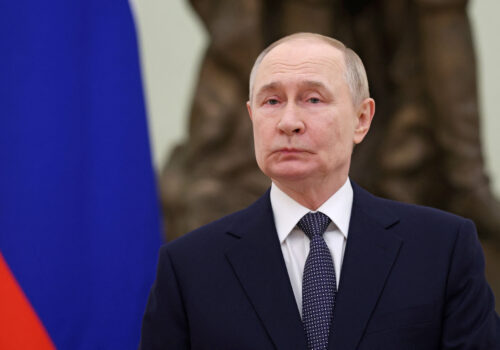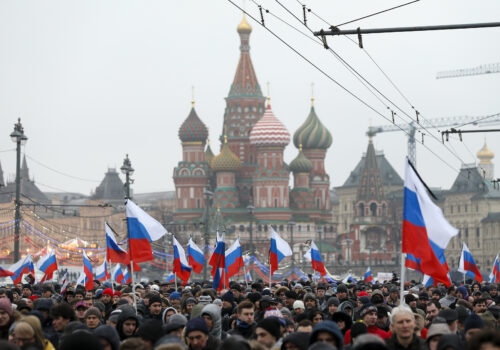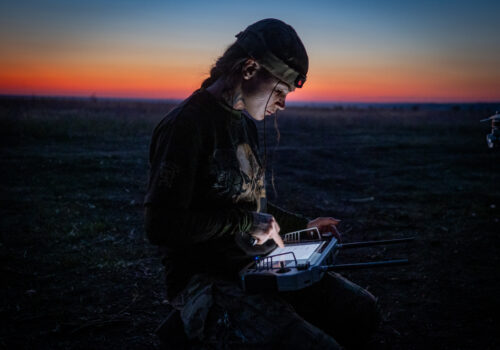Just days after US President Donald Trump announced plans for a new peace summit with his Russian counterpart Vladimir Putin, their proposed Budapest meeting has been thrown into doubt. Trump first shared news of the summit late last week following a lengthy and “very productive” telephone call with Putin. Speaking on Tuesday, however, White House officials said there were now “no plans” for the two leaders to meet in the “immediate future.”
This sudden change in tone came after US Secretary of State Marco Rubio and Russian Foreign Minister Sergei Lavrov reportedly failed to make any meaningful progress during a preliminary call ahead of planned talks in Budapest. Lavrov later confirmed that Putin had dismissed Trump’s ceasefire proposal and remained fully committed to achieving the maximalist goals of his invasion. “A ceasefire now would mean only one thing: A large part of Ukraine would remain under Nazi rule,” Russia’s top diplomat stated.
Lavrov’s latest comments serve as a timely reminder that Moscow’s objectives in Ukraine go far beyond limited territorial concessions and extend to regime change in Kyiv. His insistence on branding the Ukrainian government as “Nazis” is nothing new, of course, but it does underline Russia’s rejection of peaceful coexistence with an independent Ukraine, while also highlighting the scale of the current disconnect between Moscow and Washington. While Trump attempts to broker a geopolitical real estate deal, Putin is seeking to secure his place in history by extinguishing Ukrainian statehood and reviving the Russian Empire.
Stay updated
As the world watches the Russian invasion of Ukraine unfold, UkraineAlert delivers the best Atlantic Council expert insight and analysis on Ukraine twice a week directly to your inbox.
It is not surprising that some within the Trump administration still struggle to grasp the true motives behind Russia’s attack on Ukraine. After all, the current invasion has been accompanied by an unprecedented deluge of disinformation designed to distract international attention from Putin’s imperial ambitions. Since 2022, the Kremlin has sought to pin the blame for the invasion on everything from NATO enlargement to phantom fascists. Moscow’s many excuses have undeniably succeeded in clouding perceptions of the war, but none of the justifications presented by the Kremlin can stand up to serious scrutiny.
Putin has repeatedly framed the war as a response to decades of NATO expansion that has brought the alliance ever closer to Russia’s borders. His own actions, however, have largely debunked this argument. When neighboring Finland responded to the invasion of Ukraine in spring 2022 by announcing plans to join NATO, Putin did nothing and said he had “no problem” with Helsinki’s decision. He has since gone even further and withdrawn most Russian troops from the frontier with Finland. Given the fact that Finnish accession virtually doubled Russia’s shared border with NATO, this nonchalance is revealing. Clearly, Putin knows very well that NATO poses no threat to Russia itself. His real problem is with Ukrainian independence not NATO expansion.
The Kremlin’s claims to be waging a crusade against Ukrainian Nazis are even more far-fetched. Russian attempts to equate Ukrainian national identity with Nazism date all the way back to World War II and have been enthusiastically revived by the Putin regime. This approach shamelessly exploits the Russian public’s reverence for the Soviet role in the defeat of Hitler, while conveniently ignoring the political realities in today’s Ukraine.
Ever since Ukraine regained independence in 1991, Far Right political parties have been relegated to the margins of the country’s fledgling democracy. During Ukraine’s last prewar parliamentary election in 2019, most nationalist parties formed a single coalition in a bid to overcome years of ballot box disappointment. They failed miserably, receiving just 2.16 percent of the vote.
Nothing has exposed the absurdity of Kremlin attempts to portray Ukrainians as Nazis more than the election of Jewish candidate Volodymyr Zelenskyy as the country’s president. Ever since Zelenskyy won the presidency by a landslide in 2019, Putin and other Kremlin officials have engaged in deeply unsavory mental gymnastics as they have struggled to explain how a supposedly Nazi nation could overwhelmingly vote for a Jewish leader. The most notorious example of this disgraceful trend came in spring 2022, when Russian Foreign Minister Lavrov declared during an Italian television interview that “Hitler also had Jewish blood.”
Eurasia Center events

Putin has typically been far franker about his war aims when speaking to domestic Russian audiences. For years, he has argued that Ukrainians are in fact Russians (“one people”) who are occupying historically Russian lands and have no right to a separate nation of their own. On the eve of the full-scale invasion, he began referring to Ukraine as an artificial “anti-Russia,” and took the highly unusual step of publishing a rambling 5000-word history essay that read like a declaration of war against Ukrainian statehood. Following the outbreak of hostilities, he began proclaiming the “return” of Russian lands and comparing his invasion to the imperial conquests of eighteenth century Russian Czar Peter the Great.
The criminal actions of the Russian army in Ukraine have been profoundly shaped by Putin’s bitter opposition to Ukrainian national identity. In areas under Kremlin control, anyone viewed as a Ukrainian patriot or deemed a potential threat to the occupation authorities is likely to disappear into a vast network of camps and prisons. A United Nations probe has ruled that these mass detentions represent a crime against humanity.
Huge numbers have also been deported. This includes tens of thousands of children, who are subjected to ideological indoctrination to rob them of their Ukrainian heritage and impose a Russian identity. Those who remain in occupied Ukraine are being forced to accept Russian citizenship amid a brutal campaign to systematically erase all traces of Ukrainian history, culture, language, and identity. This genocidal conduct makes a complete mockery of attempts to portray the invasion of Ukraine as a mere border dispute that can be settled via limited land swaps.
Putin’s Ukraine obsession is rooted in his experience as an eye witness to the collapse of the Soviet Empire while serving as a KGB officer in East Germany, and reflects his fears that the further consolidation of a democratic and European Ukraine could act as a catalyst for the next stage in Russia’s imperial retreat. Beginning with the 2004 Orange Revolution, his determination to force Ukraine back into the Kremlin orbit has come to dominate Russian foreign policy and has slowly but steadily compromised Moscow’s relationship with the wider Western world. Putin has now bet everything on the reconquest of Ukraine and knows that his entire reign will be judged by the outcome of the current war.
If Trump wishes to end the bloodshed in Ukraine and secure his precious Nobel Peace Prize, he must first recognize that Putin is playing for the highest possible stakes on the stage of history and will never compromise unless forced to do so. Indeed, he dare not back down. At this point, anything less than the destruction of Ukraine as a state and as a nation would be regarded in Moscow as a major defeat that would plunge the Kremlin into crisis.
Putin will doubtless continue to profess his desire for peace while engaging in stalling tactics and playing for time. He will string Trump along with yet more seductive phone calls and headline-grabbing summits that flatter the US leader’s ego, but he will almost certainly not enter into genuine peace negotiations until the alternative is defeat in Ukraine and disaster for Russia itself. The sooner Trump accepts this reality, the sooner we can move beyond the current phony peace process and begin the hard work of securing a sustainable settlement through the long overdue application of Western strength.
Peter Dickinson is editor of the Atlantic Council’s UkraineAlert service.
Further reading
The views expressed in UkraineAlert are solely those of the authors and do not necessarily reflect the views of the Atlantic Council, its staff, or its supporters.

The Eurasia Center’s mission is to enhance transatlantic cooperation in promoting stability, democratic values, and prosperity in Eurasia, from Eastern Europe and Turkey in the West to the Caucasus, Russia, and Central Asia in the East.
Follow us on social media
and support our work
Image: ddp/Sven Simon via Reuters Connect




